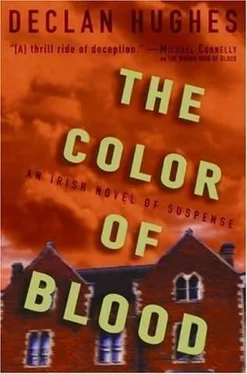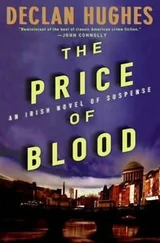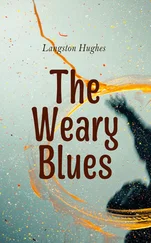I walked back through the churchyard. An early-evening mass had finished, and a straggle of old ladies was emerging, the fleet helping the lame down the church steps; they grabbed their shopping trolleys or their walking frames and trundled off unsteadily into the falling night. A board mounted in the porch told me it was the Church of the Immaculate Conception, that the parish priest-and the only priest-was Father James Massey, and that tonight there would be Exposition of the Blessed Sacrament in an all-night vigil leading into dawn mass on All Souls’ Day. Years ago, a parish this size would have had two or three priests; now they were probably doing well to have one to themselves. I went around to the side chapel entrance at the rear of the church and knocked on the sacristy door. It pushed open under my hand, and I went in; to my right was a small office area with a desk and chairs and a filing area; ahead, stretching around the corner I could see Formica counters, a sink and shelves with church ornaments and hangings.
“Father Massey?” I said.
A tall, stooped, balding man of about seventy appeared, drying his hands and face on a towel. He had removed his vestments and was wearing the black shirt priests favored for day wear; without the clerical collar it looked incomplete, and so did he.
“What is it?” he asked, his voice sibilant, slightly high.
“I was wondering if you remembered a parishioner of yours, she would have had a son here maybe twenty years ago. Eileen Dalton, her name was. She may have been married here too. Her maiden name was Casey.”
“It wasn’t, but no matter. Yes, I remember her. What connection have you with her?”
His manner wasn’t unfriendly, just direct, guarded, maybe even protective.
“My name is Edward Loy. I’m a private detective, working for the Howard family. Eileen Casey was the mother of a boy who was thought to have murdered Audrey O’Connor, the first wife of Sandra Howard’s husband Richard. Eileen was in service with the Howards at that time. Stephen Casey then was believed to have killed himself. Not long after, Eileen was in a position to buy a house in Woodpark, where she married a man called Dalton.”
“And what do you want to know?”
“Where Eileen Casey, or Dalton, is now. And what she can tell me about her son.”
Father Massey looked at me appraisingly.
“When you say you’re working for the Howards…”
“It means Sandra Howard is paying me. But I’m bound by the laws of the land. Her money doesn’t buy her family a free ride.”
“Because I saw the awful news about Jessica Howard on the television last night. Are you saying what happened twenty years ago has something to do with that?”
“I’m almost certain that it does. I don’t know how yet. But anything you can tell me could be vital.”
Father Massey turned and disappeared from sight. When he returned, he had put his collar on and a black jacket over his shirt; he carried two heavy, leather-bound books under his arm. He laid them out on the desk and opened one to December 1985.
“This is the marriage register entry: you can see here, December twelve, Eileen Mary Harvey married Brian Patrick Dalton, their signatures there.”
He passed me the marriage register and opened the second book and quickly found the page he was looking for.
“Now, here it is, after what we are no longer allowed to call a positively indecent gap, twenty-eight March 1986, a son christened Jeremiah John Dalton.”
He passed me the second volume. I took it, glanced at it and set it down.
“That was very easy,” I said. “If all information was that simple to obtain, I’d be out of a job.”
Massey’s wan face warmed to pink.
“What do you mean?”
“I mean, I come in out of the blue asking about a marriage and a christening from twenty years ago and you just happen to have the registers at hand and find the entries in seconds. Surely you can’t remember everyone you marry, every child you christen, off the top of your head.”
Massey had flushed red now. He turned his face away from me, and when he spoke, his light voice wavered.
“Ah but poor Eileen was a special case. None of us could forget Eileen.”
“And why is that?”
“Because young Dalton ran out on her a month before the baby was born. And a month after the birth, Eileen herself couldn’t take any more. She left the baby in the porch you entered, then slipped back home, sealed up the kitchen, turned the oven on and gassed herself. The strain of it all, the son dying, the young husband leaving, she may have been depressed after the birth…God only knows what darkness haunts one of His children when they feel driven to take that decision.”
Massey turned to me, and I saw that there were tears running down his smooth, unlined face.
“Such a beautiful girl…too beautiful, now, too trusting, too quick to sit on a handsome lad’s knee, too much life in her, more than she could manage, and no one she could trust to help her cultivate it, help it grow. Such beauty…such a waste.”
He shook his head and wiped his face with a large white handkerchief.
“Forgive me. You’re absolutely right, there are people I married last year and I would probably not recognize them if they walked through that door this minute. But you couldn’t forget Eileen Dalton.”
“What happened to the child?”
“Oh, the Howards took care of everything. They paid for the funeral, such flowers, and they arranged adoption for the child with a family they knew.”
“How’d they manage that? I mean, didn’t they have to go through some kind of agency?”
“In theory. In practice, John Howard was chair of the board of the Adoption Authority, and two of the board members were ex-students of his, and another was the chaplain at the Howard Medical Center, and the adoptive father was a senior colleague of Howard’s, so the whole thing went through on a hush-hush little nod. A nice respectable family the baby went to though, a very good family.”
There was something sardonic about the way Massey said this, which, combined with the obvious affection he had had for Eileen Dalton, made me like him immensely.
“Did they take the house too?”
“Oh no. The Dalton fellow’s name was on the deeds, you see. And there was no mortgage. After a while, the council boarded it up; kids were having cider parties and all sorts up there. It’s only this last eighteen months it’s been done up; I heard it was sold, and the new owner has rented it out. Which I suppose means Dalton was out there all along, the blackguard.”
“The house,” I said. “Is it the second in the terrace just past the church?”
“That’s right,” he said. “Pearse Terrace. How did you know? But you’re a detective, I forgot. I suppose you dug it up, Mr. Loy.”
I rose to leave, and he gathered the registers together.
“By the way, you were absolutely right about something else too,” he said.
“And what would that be?”
“Deducing that I had shown these books to someone recently.”
“Was it a young man, slim build, long black hair, good-looking?”
Father Massey laughed and said, “Oh dear me no, I’m afraid not,” in almost a camp way. “Quite the opposite, old and red and fat. Solicitor for the Howard family, he said he was. Nice person, just not at all easy on the eye. I’m sure you know him. Denis Finnegan.”
In the churchyard, there was someone standing by my Volvo. As I got closer, I saw that it was Jerry Dalton, and that he was putting something beneath my windscreen wipers. I walked a little slower then, trying to creep up on him, but the blare of a car horn alerted him to the danger; he looked back at me, then bolted for the road; I chased him, but he had too much of a lead, and twenty years, on me; Anita was waiting across the road in the Punto; Jerry Dalton got in beside her and they took off. No sign of Emily. I jumped the three-bar fence and knocked on the door of the Dalton house, once, twice, three times. No reply. I opened the letterbox and shouted through it.
Читать дальше










